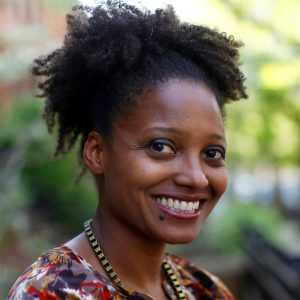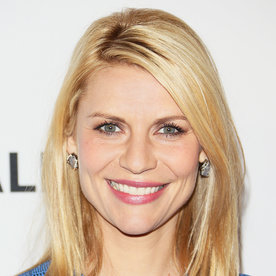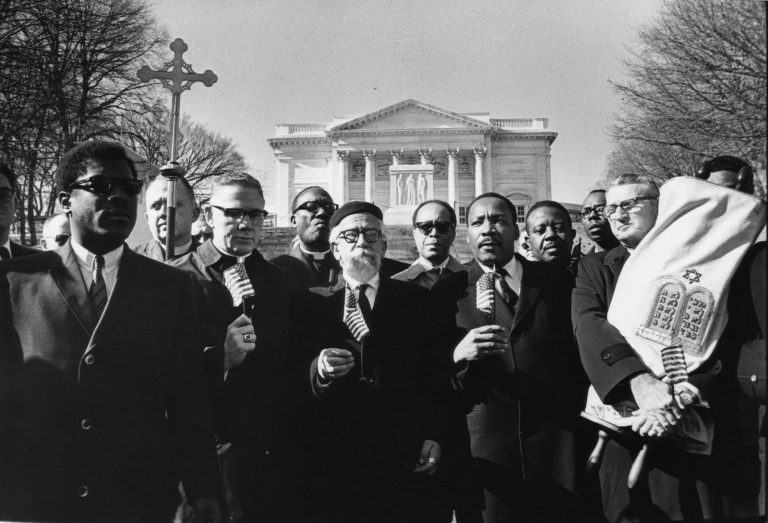Claire Danes, Ellen Burstyn, Tracy K. Smith, et al.
Stories About Mystery
We often find ourselves talking to poets and writers about the vivid connections between art and faith. This special hour came out of a live collaboration between On Being and Selected Shorts at Symphony Space in New York. Claire Danes, Ellen Burstyn, Julie White, and U.S. poet laureate Tracy K. Smith joined us with stories and poems about meaning and mystery.

Image by Chang Liu/Unsplash, Public Domain Dedication (CC0).
Guests

Tracy K. Smith is a professor of creative writing at Princeton University and the former Poet Laureate of the United States. Her poetry collections include Life on Mars, winner of the Pulitzer Prize, Duende, and Wade in the Water. Her memoir is Ordinary Light. She’s the co-editor of the book, There’s a Revolution Outside, My Love: Letters from a Crisis.

Claire Danes is a film and television actress best known for her starring role in the series Homeland. She is the winner of three Emmy awards, four Golden Globe awards, and two Screen Actors Guild awards.

Ellen Burstyn is an actress whose film, television, and theatre career spans six decades, including roles in The Last Picture Show, The Exorcist, Requiem for a Dream, and House of Cards. She is one of few performers to have won an Academy Award, an Emmy Award, and a Tony Award.

Julie White is a film, stage, and television actress. She is known for her roles in Grace Under Fire, Nurse Jackie, and the play The Little Dog Laughed, for which she won a Tony Award for Best Performance by a Leading Actress.
Transcript
Krista Tippett, host: In our show, we often find ourselves talking to poets and writers about meaning and mystery and how intertwined these things are with both art and faith. So it seemed natural to team up with Selected Shorts, which nurtures an important truth: we need stories.
As part of a live Selected Shorts evening at Symphony Space in New York, we were joined by Claire Danes, Ellen Burstyn, Julie White, and now-poet laureate Tracy K. Smith.
I’m Krista Tippett, and this is On Being.
[music: “Seven League Boots” by Zoë Keating]
Ms. Tippett: We need words that shimmer and enliven and wake us up and help us heal. Our first story, by the imaginative, tender, and funny writer Aimee Bender, involves healing. “The Doctor and the Rabbi” wraps itself around the whimsical and touching inexplicability of life, even spiritual life, and the way our deepest selves find their way in our bodies. I love the sin this story calls out in one of its early lines — “the sin of living small,” something no one can say of its reader, the mighty Ellen Burstyn. Here she is with an abridged version of Aimee Bender’s “The Doctor and the Rabbi.”
[applause]
Ellen Burstyn: “The doctor went to see the rabbi. ‘Tell me, rabbi, please,’ he said, ‘about God.’
The rabbi pulled out some books. She talked about Jacob wrestling the angel. She talked about Heschel and the kernel of wonder as a seedling that could grow into awe. She tugged at her braid and told a Hasidic story about how it is said that at the end of your life, you will need to apologize to God for the ways you have not lived.
‘Not for the usual sins,’ she said. ‘For the sin of living small.’
A few months later, the rabbi became sick. She had a disease of the blood, a disease that needed weekly transfusions that she scheduled on Wednesdays so she would be at her best for Shabbat.
The doctor who had come to see her was a doctor of blood, a transfusionist.
She thought of him as she sat with her husband, staring at their enfolded hands, wondering what to do.
‘That man,’ she said, looking up. ‘That man who came by a few months ago.’
When the rabbi was in her paper gown she looked smaller, of the earth, and the doctor did not mind the role reversal.
‘I’m so sorry you have to go through this,’ he said.
The rabbi lay down on the cold table. She offered her arm. The blood drained from her; the blood of another person filled her. The doctor stood beside her and reset the instruments in a line.
The rabbi came for many transfusions, and she recovered at a brisk pace, filled with the blood of Hindus and Lutherans. The treatments went so well, she didn’t have to visit as often anymore, and the doctor missed seeing her at the clinic. After a month had gone by, he went to her office again, where he found her talking to another rabbi, massaging the bottom of a stockinged foot.
She hugged him and pressed his hand and thanked him, and he said he would like to talk to her again.
‘About God?’ she asked.
‘I’m not sure,’ he said. ‘I don’t think so.’
They went to a coffee shop, because she could now go no longer than two hours without food.
‘I — I gave you the blood of other religions,’ he blurted.”
[laughter]
“She laughed out loud, lifting out the croissant. ‘No problem,’ she said. ‘I like what you gave me. It’s great. How did you know?’
‘There’s a box on the donation form,’ he said. ‘An optional box.’
‘How interesting that it’s a box on a form,’ she said, chewing. ‘I’ve never heard of that before. So who did I get?’ she asked, now dipping the croissant torso.
His hands were shaking slightly. He put them flat on the table, to calm them. He wasn’t sure why he was so nervous around her.
‘Christians,’ he said, ‘of all sorts, including a Jehovah’s Witness. Several Muslims, a few Jews.’
‘Well, maybe it’s a new route to world peace,’ she said.”
[laughter]
“‘Transfuse people.’”
[laughter]
“‘And atheists?’ he said, tentatively.
‘What about them?’
‘I gave you atheist blood, too,’ he said.”
[laughter]
“He cringed, visibly.
She laughed again. All that warmth in her laugh, like it could embrace someone across a room.
‘I don’t hate atheists,’ she said.
‘I’m an atheist,’ he said, a little too loud, and he reached out for her hand.
For a second, she held his. His hand was much wider than hers, and her hands, not usually considered dainty, looked small and slender next to his.
‘I’m not here to push anything on you,’ she said. ‘Lots of Jews I know are atheist Jews.’
‘Your eyes shine,’ he said. ‘How do they do that?’
‘Blood,’ she said.”
[laughter]
“He returned to the rabbi’s office. His mother was not well. She had cancer. She was in the hospital.
‘I have been unable to work very much this week,’ he told the rabbi. ‘I took two days off.’
‘Makes sense,’ she said.
She was also surrounded by cardboard boxes of donations for a charity drive and had just started sorting items into piles: a kid clothing pile, an adult clothing pile, a book pile, a toy pile.
‘Want to help?’ she asked.
‘Sure.’ He took the free seat. She had a pile of books in her lap and was separating them into kid and adult levels.
He opened a donation box: sweaters. The rabbi was divvying up her book piles, but he could tell she was listening. She divvied quietly.
‘Let me ask you a question,’ said the rabbi, balancing the last book in the adult pile. ‘You’re here to see me. Why?’
‘Because I like seeing you.’
‘Well, I like seeing you, too. But you could go to a friend, to a colleague.’
‘I like seeing you,’ the doctor said again.
‘Well,’ said the rabbi, steadying the chicken in her lap. ‘I ask, because I have a rabbi kind of thing to say.’
‘Let’s hear it,’ he said.
‘You could pray,’ she said, ‘either on your own, or with us.’
‘Oh,’ said the doctor. ‘Nah, I don’t do that sort of thing.’
‘Why not?’ she said. There was no edge to her voice, just interest.
‘Just because I think it’s useless,’ he said, ‘and a little creepy.’
She laughed. ‘OK,’ she said. The red chicken bobbed in her lap. ‘Fair enough.’ She glanced at the adult clothes pile.
‘And,’ he said, after a minute, shaking out a T-shirt, ‘just to play along, you know — I wouldn’t want to use up the line space.’
The rabbi leaned in. She seemed to have forgotten about the piles, for the moment. Her eyes were beams of light. ‘But there’s no line,’ she said.
‘How do you know?’
‘Well, I don’t know,’ she said. ‘But you’re using an example that doesn’t fit, an example that is of this daily world. You have to think differently.
‘The best way I can think to describe it,’ she said, ‘is the way, when you’re driving on the freeway at night, how everyone can see the moon in their window, every car on the road. Every car feels the moon is following that car. Even in the other direction, right? Everyone in that entire hemisphere can see the moon and think it is there for them, is following where they go.
‘That,’ she said, ‘is a little closer to how I imagine it works. Whether or not you pray has absolutely nothing to do with the person to your left. It’s like saying you shouldn’t get the moon in your window, or else the other cars wouldn’t get the moon in their windows. But everyone gets the moon. It’s not an option, to not have the moon in your window. You just see it. It’s there.’
She bit her lip. The window in the office grew golden with late afternoon.
‘Half the world can’t see the moon,’ said the doctor.
‘It’s not—’ she said, clasping her hands together around the giraffe, ‘it’s not so literal.’
‘I am literal,’ he said. ‘I think literally. The moon is also unresponsive.’
He wiped his forehead with his sleeve. It was hot in her office.
‘I apologize for being so stubborn.’
‘You weren’t stubborn,’ she said, leaning over and unpeeling the tape on a new box. ‘You were actually pretty open. In a way, in my book, we just did it.’
‘Did what?’
‘Prayed, in a way,’ she said. ‘Wrestled with it.’
‘Why do you say that?’ He sat up taller. For some reason, the thought made him angry.
‘Because you’re leaning in,’ she said, unfolding the box flaps. ‘Because I am tired in a way that I recognize. Because you seem to be fighting up from under some water — into what, I don’t know; into something. Because we were talking about it deeply,’ she said. ‘I could feel it.’
‘We were having an argument!’ he said. He stood up, but her office was too small to pace, so he turned away and stepped away and found himself going through the door and going down the hall to use the bathroom. The space held the loneliness particular to an unused bathroom, the glare of fluorescent lights, the echo of sink and crumpling paper, the tired isolation of one person in an office building alone, at night, working too late. He used up ten paper towels on his face and neck, until he was sufficiently dry. He washed his hands carefully in the sink. He took the back exit.
The rabbi sat in her office for 45 minutes, unpacking the last donation boxes, to see if he would return, but he did not return. And so she shouldered her bag and walked the seven blocks home.
The doctor found his car in the parking lot, one of the last three there, and joined the flow on the street. He drove with his air conditioner fan on full blast, into traffic as the sun set, into dusk, with the full moon rising in his rearview mirror, almost taunting him with her big presence in his car, alone, and every car around, and none of it being how he liked to think or was interested in thinking. And yet, he could feel it, just feel it: the glimmer of something that he did not understand. He would never call it God. He would not call it prayer. Comfort and fear rose together inside him, like standing in the middle of a meadow where no one had his back.”
[applause]
Ms. Tippett: Ellen Burstyn, performing an abridged version of Aimee Bender’s “The Doctor and the Rabbi.” I’m Krista Tippett, and this On Being. We’re hearing some stories and poems that were part of a live Selected Shorts evening I hosted at Symphony Space in New York.
We’re looking at stories and poems about spirituality and faith. And some of them touch on age-old questions, like: Who is up there? Who is listening? Who made it all?
Our next piece is from Elmore Leonard, best known as a writer of nearly 50 westerns and crime novels. He’s admired for writing dialogue like people actually speak — though we have to take his word about how the angel Gabriel and Mary might converse with each other during a college football game. His “Spirituality, With or Without a Prayer,” is read by Julie White.
Julie White: “A treatment of how the 35 percent who pray with some hope of reward, the 45 percent who don’t expect their prayers to be answered, and the 16 percent who never pray at all manage in a win-lose situation.
With six seconds remaining in the football game, fourth down, his team four points behind, Chip, the quarterback, calls time and jogs over to his coach on the sideline. The coach, his cap mud-stained from having thrown it to the ground several times, stares from midfield toward the goalpost. In his Deep-South way of speaking, he says to his quarterback: ‘Honey, you know what you have to do. Throw the Hail Mary. Wing it down there and pray it gets caught by one of ours.’
‘Coach, who’s gonna block?’
‘Listen to me, son. It’s the same situation Doug Flutie faced back in ‘84. Even the score’s the same. Boston College down 45 to 41, the ball is on Miami’s 48, six seconds left to play. Little Doug hit his roommate, boy name of Gerard Phelan, and won the game 47-45. Run it off the shotgun, Chipper. Drop back, give your people time to get down there, and put it up.’
‘I dropped back,’ Chip says. ‘I’m throwing the ball 60 yards, and I’m getting rushed.’
‘Same as Flutie.’”
[laughter]
“‘And you’re bigger than he is.’
‘Coach, it’s raining, the ball is wet…’
‘Son, Flutie had rain, mist and a high wind.’”
[laughter]
“‘He went back to near his own 40, scrambled, threw the ball into a 30-mile-an-hour gale, and pulled the game out. You know what his coach said? He said, “Mary was definitely listening to us, as we sure needed that one.”’
‘We actually say a Hail Mary?’
‘Won’t hurt you none. Go on out there…’”
[laughter]
“‘And I’ll pray you got the arm.’
In the huddle, a circle of gold helmets and face guards, chin straps hanging, a grumble of pain-inspired obscenities, Chip calls the Hail Mary and tells the players, ‘Let’s put our hands in here, and we’ll say it together.’
Three of his teammates, believers in the efficacy of prayer, start right in. ‘Hail Mary full of grace, the Lord is with thee. Blessed art thou…’
‘Hold it. Time out,’ says the one who has never prayed in his life and isn’t going to start now. ‘Leave me out, man. Prayin’ ain’t my style.’
Chip says to him, his running back: ‘Come on, Scoot. We’re a team.’
‘Hear what I’m sayin’ to you, Chippy. I score, it’s me doin’ it, not some lady showin’ me the holes.’”
[laughter]
“A voice representing the five players who do pray, but without hope of reward, offers, ‘We can try it…’”
[laughter]
“‘But who says a Hail Mary is gonna work?’
‘Even if it does,’ another doubter adds, ‘how do we know it was the prayer that made it happen?’”
[laughter]
“‘Yeah, like a guy who’s dying, all of a sudden gets better, and they say it’s a miracle. What if they didn’t pray, and he got better anyway?’
‘Man dies, it’s his time,’ Scoot says. ‘He don’t, it ain’t.’”
[laughter]
“‘They’ll go with a nickel defense.’ This is a teammate offering an obstacle. ‘Be like a jump ball, up for grabs.’
‘Look,’ Chip says, ‘right now we’ve got a 50-50 chance of scoring. We say the Hail Mary, it’ll put the odds in our favor.’
‘You get the Heisman,’ Scoot says, ‘you gonna share it with that lady?’”
[laughter]
“‘Come on,’ Chip says. ‘We’re wasting time. Hail Mary full of grace…’
‘What if they’re praying too?’”
[laughter]
“‘Who gets it?’”
[laughter]
“A whistle blows. They draw a five-yard penalty for delay of game.”
[laughter]
“The coach throws his hat in the mud and stomps on it.
Meanwhile, the angel Gabriel hears that Mary has been hailed again and…”
[laughter]
“He’s checking on it.”
[laughter]
“‘Another petition?’
‘It’s a college game, a good one, and tomorrow you’ll have the pros.’
‘Yes, but their Hail Marys are all in name, only.’
‘I understand St. Jude has a few of the more hopeless situations.’
‘Well, that’s what he’s known for.’
Mary pauses and looks off, as if listening to a distant sound. ‘They’re coming out of the huddle. Their uniforms are blue and gold.’
‘Your favorite colors.’”
[laughter]
“‘It’s a Catholic school.’
Mary looks him in the eye. ‘You know I don’t play favorites.’
‘Except the last five Hail Mary requests came from Catholic schools, and they won.’
‘Oh, they pray for field goals, third-down conversions, everything. But did I change the natural course of events in those games?’
‘There are those who say you get defensive backs to run into each other, not unlike the Flutie Hail Mary. This one, the quarterback will have to toss it at least 65 yards.’
‘And he wants my help. Bless his heart.’
‘Well, you know, a third of the team would also like your help,’ Gabriel reminds her. ‘Nearly half of them say they would, but don’t believe you’ll come through.’
Mary nods. ‘And we always have those who never pray.’
Gabriel agrees. ‘The usual breakdown.’
‘I shouldn’t say this,’ Mary tells him, ‘but I don’t think much of their coach. If the two-minute drill works so well, why didn’t he have them running that earlier in the game?’
‘But then it’s not a two-minute drill.’
And Mary tells him, in her quiet manner, ‘You shouldn’t always take what I say quite so literally.’”
[laughter]
“‘Forgive me.’
“‘Now he’s ruined his cap.’
Gabriel waits a moment before saying, ‘Well, the ball’s in the air. It’s your call.’
Mary gives him the smile that inspired Leonardo’s imagination and asks, ‘Are you sure?’
Chip is blitzed, mired in the turf beneath a pair of linebackers. He doesn’t see the completion, though the instant he hears the crowd, he knows and has the presence to offer a thank-you to the wet mass of sky hanging over him. By the time he gets to his feet, grinning, about to be mobbed, he catches a glimpse of a TV reporter on the sideline, shoving a mike at one of his teammates.
‘This your first Hail Mary catch, Scoot?’
Scoot frowns. He says, ‘Hail Mary?’ — glancing from side to side — ‘I didn’t see no lady around. I juked the corner. That man’s still looking for me — where’d I go? No, I didn’t see no lady as I’m takin’ in that wobbly pass over my shoulder, reachin’ way up and then tuckin’ it in so nobody didn’t have a gun gonna take it away from me. You understand what I’m sayin’?’”
[laughter]
“‘Yes, but barely,’ the angel Gabriel is thinking.”
[laughter]
“Now he turns to Mary, because he has to ask. ‘You played a favorite that time, didn’t you? Not one person in the stadium thought Chip would get that pass in the air, but somehow, he did, just as he was hit.’
Mary shows the smile again that can tell you nothing or everything, and says, ‘The Scooter wasn’t bad either, was he?’”
[laughter]
Ms. Tippett: Julie White, performing Elmore Leonard’s “Spirituality, With or Without a Prayer.” For an evening of On Being at Selected Shorts, we invited a poet I very much admire, Tracy K. Smith. Poets are storytellers too, and in the poem that follows, Tracy tells us about life and God and the cosmos. Here she is, to read: “The Universe as Primal Scream.”
Tracy K. Smith: This is a poem called “The Universe as Primal Scream.” And I think, when I wrote the first few lines, I thought I was writing about the occasional frustration of living in a New York City apartment. And then the poem had other ideas.
“5pm on the nose. They open their mouths / And it rolls out: high, shrill and metallic. / First the boy, then his sister. Occasionally, / They both let loose at once, and I think / Of putting on my shoes to go up and see / Whether it is merely an experiment / Their parents have been conducting / Upon the good crystal, which must surely / Lie shattered to dust on the floor.
Maybe the mother is still proud / Of the four pink lungs she nursed / To such might. Perhaps, if they hit / The magic decibel, the whole building / Will lift-off, and we’ll ride to glory / Like Elijah. If this is it — if this is what / Their cries are cocked toward — let the sky / Pass from blue, to red, to molten gold, / To black. Let the heaven we inherit approach.
Whether it is our dead in Old Testament robes, / Or a door opening onto the roiling infinity of space. / Whether it will bend down to greet us like a father, / Or swallow us like a furnace. I’m ready / To meet what refuses to let us keep anything / For long. What teases us with blessings, / Bends us with grief. Wizard, thief, the great / Wind rushing to knock our mirrors to the floor, / To sweep our short lives clean. How mean
Our racket seems beside it. My stereo on shuffle. / The neighbor chopping onions through a wall. / All of it just a hiccough against what may never / Come for us. And the kids upstairs still at it, / Screaming like the Dawn of Man, as if something / They have no name for has begun to insist / Upon being born.”
[applause]
Ms. Tippett: That was Tracy K. Smith, reading her poem, “The Universe as Primal Scream.” You can listen again to all of the stories and poems featured in this show through our website, onbeing.org. I’m Krista Tippett. On Being continues in a moment.
Ms. Tippett: I’m Krista Tippett, and this is On Being. Today, with stories and poems that were part of a live Selected Shorts evening I hosted at Symphony Space in New York. In our show, we often find ourselves talking to poets and writers about meaning and mystery and how intertwined these things are with both art and faith. So it seemed natural to team up with Selected Shorts, which nurtures an important truth: we need stories. We are strange and beautiful and heartbreaking and contradictory, through and through. I always say, I wish for a world free of murder, but not free of murder mysteries — and certainly not free of brilliant TV storytelling about our contradictions, like Homeland, which I watch religiously. So it makes me especially happy that Claire Danes performed this next story, “You Must Be This Happy to Enter,” by Elizabeth Crane. It’s about the playful and perilous edges of us, and how hard it can be to tell the difference between them.
Claire Danes: “What happened was I was at yet another dreadful opening when some dude in those kind of architect glasses said to me something like, ‘That which doesn’t provoke has no meaning…’”
[laughter]
“…and you know, first of all, who talks like that — ‘That which’ — nobody, is who, and second of all, well, it just burned me. It’s not irrelevant that the show that night was by this artist who does these giant installations of Barbie war scenes, with, like, hundreds of Barbies with their hair all chopped off, dressed in camouflage and carrying machine guns; dead and wounded Barbies all over, with their very lifelike guts spilling out. And Kens tending to the victims dressed in those old-timey white nurse costumes with the little red crosses on them, but with short pants and cutoff sleeves.
I’ve stopped trying to figure out what people like this are even trying to say because I’m not trying to hear it. I don’t care if you think the only thing worth depicting in your art is a soulless, violent, war-torn world. I don’t care, Mr. Gallery Glasses Guy, for the long-winded, thesaurus-y explanation about why the lone pencil mark Joe Grad-student left on your wall is a brilliant denouncement of beauty in art.”
[laughter]
“I don’t understand why it has to be hard and sad and bad for it to be deep.
We’ve all had our hard, sad badnesses in life, and I just thought, ‘Would it be so wrong for art to be about something happy?’ It’s a legitimate feeling.”
[laughter]
“So, I think you can see that this is where the bells went off for me and right then I decided to do something about it. I started my own gallery, and I made a giant sculpture to go out front so that you know before you even go in what the deal is. I’m primarily a photographer, but in this case, I wanted something really eye-catching to make my point and draw people in.
Remember those little figurines of babies from Spencer Gifts or wherever that said, I love you this much, with arms open wide? This statue is like a giant version of that, except it says, You must be this happy to enter.”
[laughter]
“For the opening I went to great lengths to create work that was, as I saw it, not about anything besides the true joy of life. In the window, I hung a photo I’d taken of this woman totally laughing — no doubt because she’s eating ice cream, but she’s super thin and from what I can see rich, and she’s out shopping, and why shouldn’t she be happy?”
[laughter]
“Inside I hung many other photos of people being happy. On one wall I hung what I call the happy series — Happy Dude, Happy Dude Wearing Shades, Happy Chick, and Happy Chick with Rainbow [Thinking about Unicorns] (for real — you could see the rainbow but I could tell there was another layer to her happiness…”
[laughter]
“…so I asked her and suggested the longer title). Plus also: Happy Family, Happy Baby Numbers 1-6 (there are a lot of happy babies out there and I think some of us could take a lesson from them), plus also Happy Waving Abraham and Silas, Ten Months (twins who have a very positive outlook in spite of their origin of smallness). On another wall I hung the love series: Love Rocks, Love Totally Rocks, Love Rocks It Hard, and Sheep Love (that’s between sheep — it’s a photo of sheep who are only just nuzzling in a very loving way…”
[laughter]
“…not people and sheep; that is not love, that’s just a bad website).”
[laughter]
“On a third wall I hung the sunshine series: Sunshine in the Bronx, Sunshine in Seattle (because people don’t think the sun shines there so much, but when it does people are exceptionally happy)…”
[laughter]
“…Sunshine on Division Street, Sunshine in Dresden, and so on.
The opening got quite a turnout, but let me tell you I was sure surprised at what ended up going down. There I was discussing my passion for happiness over a glass of wine when suddenly six police officers burst in and charged me with — well, they said I didn’t take the photo in the window and that they suspected I had not taken many of the others, and they arrested me and took me into the police station and fingerprinted me and everything. I assured them that I absolutely did take that photo, as well as all the others, and they said it was impossible for me to have taken the photo in the window, which was according to them a very famous photograph taken by some old dude named Gary Wino-something, and they attempted to verify this by pointing out that according to my driver’s license I was only 23 years old and therefore not even a thought in my mother’s head at the time of the taking of the photo.
I said, Um, I guess you guys haven’t heard of something called time travel?”
[laughter]
“This was funny to them. Ha ha ha, the police squad laughed, that’s funny.
I said I wasn’t surprised that there was a similar photograph out there, because there had been a number of people taking photos of this woman. Everyone had agreed she was unusually happy and that it was a moment that should be documented.
Young lady, they said, clearly under obligation to use phrases like this, as policemen, Young lady, they said again, Time travel? Is not real. Wouldn’t you just split right now, if it were?
Yes, I said. I just might, but I don’t have any of my stuff. It’s not just like, oh, I think I’d like to go to 1986 right now, poof. It’s an effort.’”
[laughter]
“Oh, well, of course. Well, here’s a nice cell for you until someone comes for you from the future to bail you out. Ha, ha, ha.
They put me in a temporary cell with this guy about my age who did not look like he could be guilty of anything besides being extremely foxy.”
[laughter]
“Hey, the foxy dude said to me. They bring you in here for being happy too?
This is probably the part where most people would say, Whaaaaa? but where I, being me, would and did say, I think they did!
Yeah, it’s no longer legal in three states, he said. ‘I bet you didn’t know that.’
‘No way,’ I said. ‘We have to move as soon as we get out.’
‘Seriously,’ he said. ‘Unfortunately, the jail term is open-ended. You don’t get out until you understand the true pain of life again.’
I said, ‘Nuh-uh.’
He said, ‘Yuh-huh.’”
[laughter]
“‘Well, we’ll have to fake it,’ I said.
‘Forget it. I’m incapable.’ He shrugged, like even jail wasn’t gonna make him sad, like it was only a minor inconvenience.
‘You can’t pretend?’ I said.
‘I don’t think so,’ he said.
‘What if you try thinking of something really sad?’
‘I can’t really think of anything.’
‘Your parents still alive?’
‘Happy and healthy — and rich.’
‘Married?’
‘Yeah,’ he said, almost sadly.
‘Did you ever lose a pet?’
‘My gerbil had the sniffles one time. We were a little worried, but it was fine.’
‘What about the state of the world?’
‘I know, that’s bad, but in my missionary work, I’ve found so much beauty among even the poorest people that I can’t really muster it up. Did you know that a lot of disadvantaged people around the world have such a strong faith in God that they really don’t feel sorry for themselves? I met this one girl in Costa Rica who gave her only pair of broken sandals to an old woman, because she had none at all. “Jesus will carry me,” she said. That kind of thing makes me weep all the time, but for joy.’
He was a missionary, a foxy, happy, young missionary who wept for joy! I knew right then that I was gonna have to find a way to break out. I asked him one last question I thought was a guarantee.
‘OK, look. Everyone’s had their heart broken once, at least. This is like, the doctor should just whisper this in your tiny baby ears when they hand you over to your mom. “All we know for sure is, your heart will break. And God bless.”’”
[laughter]
“‘You have to have had your heart broken.’
‘Not yet.’ He smiled at me.
That sealed it. ‘Listen,’ I said, leaning in. ‘I can get us out of here. You’ve time-traveled before, right?’
‘No way, man. That’s dangerous [bleep],’ he said.
‘No, it’s only dangerous if you stay somewhere for more than an hour. That’s when the time-space continuum starts to get warped, and the future starts changing in weird ways.’
‘What’s the point of time-traveling at all, if you don’t want to change the future?’
I had never thought about that. ‘Huh,’ I said. ‘I guess I didn’t want to be responsible. What if I set off a volcano somehow and wiped out a whole civilization?’
‘What if you adopted a crack baby who grew up to be the president? A good president,’ he added quickly, sensing where my mind was going. ‘The best president ever.’
‘Couldn’t I just do that now?’ I asked.
‘Well, yeah, I think you could,’ he smiled. He was looking soooo damn foxy right then, I just about died. But as much as I wanted to raise 16 homeless babies with him, I wasn’t convinced that raising the presidential crack baby in jail would work out completely well. So I said, ‘Look, I need to get a bunch of stuff from home. But I’ll be back.’
I started thinking about as many sad things, as hard as I could. It was very difficult, because I really am the kind of person, just like him, who sees beauty in even the darkest places. A lot of my happy photos are from places where you don’t expect to see a lot of happiness. The ‘Division Street’ photo was taken during a time when it was just nothing but drunks and bars. Like, if I had taken it at night, it would’ve been all super ‘Days of Wine and Roses’ with the neon sign montage kind of thing going on over the drunk’s head as he stumbled home, trying to remember where, or who, he even was. But since I took it during the day, I happened to catch a bunch of old guys playing cards on a stoop with the sun shining off the backs of the cards, and this one was wiping his eyes, he was laughing so hard. And for all I know, they could’ve all been drunk that whole day, and every day before it, but nevertheless, I found it to be a unique and spectacular beauty.
I took the ‘Dresden’ picture right after the war. This little girl had been crying, because she just lost her mom. I knew this, because one of the awesome bonuses of time travel is that you can suddenly speak fluent — whatever they speak in Dresden, or whatever. Anyway, she found her favorite doll in the rubble of her house and was just giggling when I took the picture.
Not to get sidetracked, but I think the reason I’m so personally happy is that I too believe hard in God’s will. And although I do not have the first idea why things happen like they do, I find myself generally untroubled, knowing that God is looking down on all of us, totally, all of the time. I know that bad, bad, bad things happen with alarming frequency, but I believe that very often, good things happen because of bad things. And I would almost argue that in my experience, more good things happen because of bad things, because if things were mostly good all the time, why would anyone try very hard to make them better? Whereas if things are mostly bad, I think people are sort of forced to rise up to their best selves. I don’t know if that makes sense, and maybe it’s super Deepak Chopra or whatever. But it’s what I think.
Anyway, that said, I was trying to get us out. So I was sitting there, thinking about conventionally sad things — war and poverty and corporate greed and terrible diseases and hurricanes and all that. And trust me, I came as near to crying as I ever have, when I thought about the president being reelected.
But none of it was working, until I thought of my future husband, the foxy young missionary. And what if we had to get married in jail and pee in front of other people for the rest of our lives and raise our babies in there because we were too happy to get out? I started imaging the beautiful lives we never had, with no simple ceremony on the beach, no cute owl mugs from the ‘70s, no barbecues in the yard, no chocolate-chip pancakes on Sunday, no new school shoes or three-ring binders, no taking the kids camping or having a spiritual experience at the Grand Canyon, no ‘No, you may certainly not have ruby-encrusted high tops, just because all the kids have them,’ no grounding them when they’ve snuck out to go to see their delinquent boyfriends, no super-8 movies of them graduating from pre-K or 8th grade, or medical school, no wrapping up together in Grandma’s ‘Love’ holey afghan on a freezing night in September already, no taking in our parents when they’re old and shaky, no nothing normal at all ever, even. And finally, I was crying so hard, it felt like I was convulsing with the pain of the whole world.
And of course, as soon as he noticed, a policeman came right over and unlocked the door. He said, ‘I can see you understand the true pain of life now. Try not to forget it.’”
[laughter]
“‘I won’t. I won’t,’ I said, wiping my tears and whispering, ‘I’ll be right back!’ to my new boyfriend.”
[laughter]
“I went home and filled my knapsack with provisions for return. I put on my fuzzy slippers, ate three Drake’s Fruit Pies, clapped four times, and said, ‘County Jail, cell block one, May 25, 2004, 7:45:33 P.M.’ You can’t take chances with the time thing, for obvious reasons. Three seconds off, and you might find yourself in a cell block with some kind of violent criminal, instead of your hot missionary.
Anyway, so I went back to the jail, only to encounter a new problem. He didn’t want to go. I didn’t figure we had a long time for discussion about it with the police guards right there. He said he was too happy. I named a whole bunch of other times and places where he could be even happier. I said we could go all the way back to Eden if he wanted to, and I promised to stay away from apples. He said he was happy enough and that he thought he could do some good, right where he was.
I was getting really discouraged, and then he finally said, ‘I think God put me here for a reason.’ You know I couldn’t argue with that. So I said, ‘Well, do you think that God put me here too?’ And he said, ‘I for sure do think that.’
I knew then that he was my soulmate and that homeless babies were not.
We just have to rise up.”
Ms. Tippett: Claire Danes, performing Elizabeth Crane’s “You Must Be This Happy to Enter.” I’m Krista Tippett, and this is On Being. We’re hearing some stories and poems that were part of a live Selected Shorts evening I hosted at Symphony Space in New York.
We end our time with one more poem, this time by David Whyte. When we had David on On Being in 2016, I asked him, as I always ask poets, how he understands what poetry works in us. He said, “Poetry is language against which we have no defense.” I’ve been pondering this a lot in a tumultuous cultural, political moment. David’s poem, “Everything is Waiting for You,” is read by Julie White.
Ms. White: “Everything is Waiting for You.”
“Your great mistake is to act the drama / as if you were alone. As if life / were a progressive and cunning crime / with no witness to the tiny hidden / transgressions. To feel abandoned is to deny / the intimacy of your surroundings. Surely, / even you, at times, have felt the grand array; / the swelling presence, and the chorus, crowding / out your solo voice. You must note / the way the soap dish enables you, / or the window latch grants you freedom. / Alertness is the hidden discipline of familiarity. / The stairs are your mentor of things / to come, the doors have always been there / to frighten you and invite you, / and the tiny speaker in the phone / is your dream-ladder to divinity.
Put down the weight of your aloneness and ease into / the conversation. The kettle is singing / even as it pours you a drink, the cooking pots / have left their arrogant aloofness and / seen the good in you at last. All the birds / and the creatures of the world are unutterably / themselves. Everything is waiting for you.”
[applause]
Ms. Tippett: Julie White, performing “Everything is Waiting for You,” by David Whyte, who despite their last names, are not related to one another.
We weren’t able to feature all of the stories from our Selected Shorts evening in New York City, including a reading of “The Strength of God, Concerning the Reverend Curtis Hartman,” by Sherwood Anderson, read by actor James Naughton, or the full version of Aimee Bender’s “The Doctor and The Rabbi,” read by Ellen Burstyn. You can find these stories and more in the Selected Shorts podcast.
Staff: On Being is Chris Heagle, Lily Percy, Mariah Helgeson, Maia Tarrell, Marie Sambilay, Malka Fenyvesi, Erinn Farrell, Jill Gnos, Lauren Dordal, Tony Liu, and Brettina Davis.
Ms. Tippett: Special thanks to our wonderful partners at Selected Shorts who made this show and our fabulous night at Symphony Space possible. They include: Jennifer Brennan, Sarah Montague, Miles B. Smith, and Matthew Love. Also, our deep gratitude to the incredible performers who made these stories sing: Tracy K. Smith, James Naughton, Julie White, Claire Danes, and Ellen Burstyn.
Our lovely theme music is provided and composed by Zoë Keating. And the last voice that you hear singing our final credits in each show is hip-hop artist Lizzo.
On Being was created at American Public Media. Our funding partners include:
The Fetzer Institute, helping to build the spiritual foundation for a loving world. Find them at fetzer.org.
Kalliopeia Foundation, working to create a future where universal spiritual values form the foundation of how we care for our common home.
The Henry Luce Foundation, in support of Public Theology Reimagined.
The Osprey Foundation, a catalyst for empowered, healthy, and fulfilled lives.
And the Lilly Endowment, an Indianapolis-based, private family foundation dedicated to its founders’ interests in religion, community development, and education.
Books & Music
Recommended Reading
The On Being Project is an affiliate partner of Bookshop.org and Amazon.com. Any earnings we receive through these affiliate partnerships go into directly supporting The On Being Project.

















